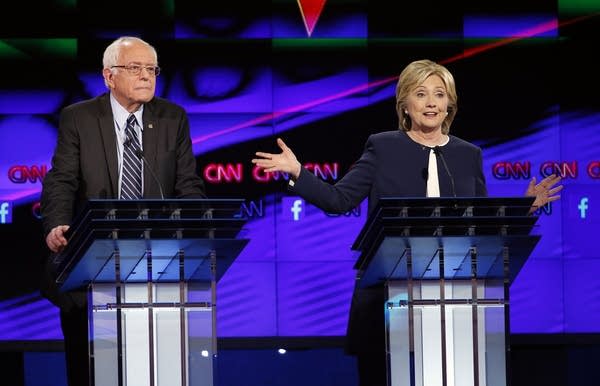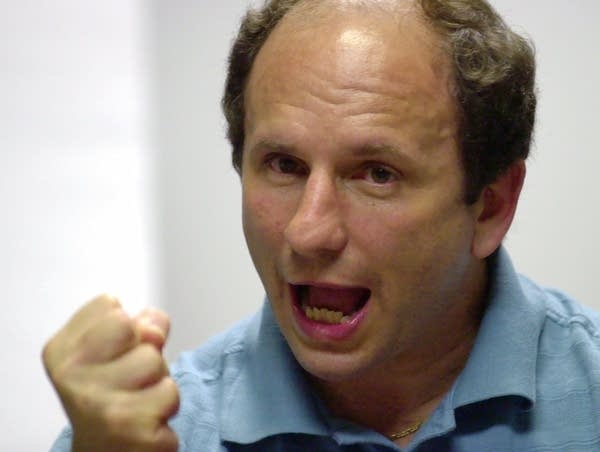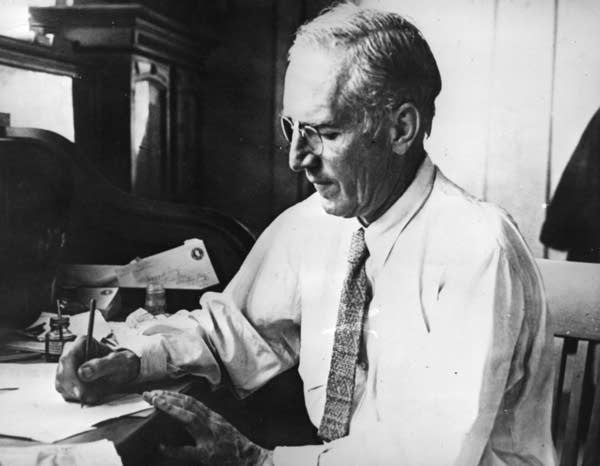Then and now: What does it mean to be 'progressive'?

Go Deeper.
Create an account or log in to save stories.
Like this?
Thanks for liking this story! We have added it to a list of your favorite stories.
The campaign for the Democratic presidential nomination has turned into a war of words over the candidates' progressive credentials.
Vermont Sen. Bernie Sanders has said former Secretary of State Hillary Clinton isn't a progressive — while touting his own credentials in the annals of progressivism.
Clinton disagrees — she calls herself "a progressive who likes to get things done" — and has slammed Sanders on the issue.
But what exactly is a "progressive?" And why is it such a big deal in the fight for the Democratic nomination?
Turn Up Your Support
MPR News helps you turn down the noise and build shared understanding. Turn up your support for this public resource and keep trusted journalism accessible to all.
It's complicated. There isn't a clear definition — no checklist of progressive bona fides or prohibitions — and its meaning has evolved with the times.
"Progressivism, progressive — those are all terms that nobody knows quite what they mean because they mean different things to different people," says Robert Johnston, a history professor at the University of Illinois at Chicago who specializes in the Progressive Era.
Clinton and Sanders are both in the Twin Cities Friday to attend the Humphrey-Mondale dinner, named for two of Minnesota's most well-known Democratic politicians.
Throughout his career, Sen. Hubert H. Humphrey pushed for legislation addressing human and civil rights violations. While he was mayor, Minneapolis enacted the first municipal fair employment law in the country.
Vice President and Sen. Walter Mondale was a key sponsor of the Fair Housing Act of 1968 — which helped open the door for minorities to move into white neighborhoods — and co-sponsored the Equal Rights Amendment in 1972.

"Discrimination against women is a documented, proven fact in many aspects of American life and a cruel reality that mars the ambitions of untold numbers of American women," Mondale said in explaining his support for the ERA.
Humphrey and Mondale are just two in a line of Minnesota politicians who might be called "progressive," though they might not have used the term to describe themselves at the time. Minnesota voters are traditionally left-leaning — the state hasn't gone to a Republican presidential candidate since Richard Nixon in 1972.
In recent years, the late Sen. Paul Wellstone became an icon of progressive politics. And Democratic Rep. Keith Ellison is also regarded as progressive; he's co-chair of the Congressional Progressive Caucus. Also a member of that caucus? Bernie Sanders.
Turn-of-the-century reform
The Progressive Era of the early 20th century was a period that saw widespread social and political activism and reform.
During that time, Progressives sought to eliminate industrial and political corruption: They attempted to make government more efficient and responsive. (The 17th Amendment allowed voters to elect their own senators — before that, state legislatures elected senators.) They tackled child labor. (Legislation established a minimum legal age at which children could work.) They took on the banking system. (The Federal Reserve System was founded in 1913.) At the same time, the women's suffrage movement was gaining steam.
Some of the most prominent names during the Progressive movement included presidents — Theodore Roosevelt and Woodrow Wilson — and muckrakers, writers and journalists who exposed the need for reform — like Ida Tarbell and Upton Sinclair.

"I would argue that you should base your idea of what a progressive is in the first time that people systematically began to use that term to describe different kinds of reform — and that was the Progressive Era, which was roughly 1900 to 1917," Johnston, the history professor, said.
But things have changed since the turn of the 20th century.
"If you're in 2016 and trying to claim that label, it means at the very least, ... you're some kind of insurgent, you are going up against the establishment or the machine," Johnston said.
"If you don't care about that history, then it kind of just means who is more liberalish/leftish than anybody else, it seems," he said.
How the word has evolved
For centuries, progressive was a neutral word that simply meant "having a tendency to go forward." It was the opposite of regressive. In the medical field, it was used to describe things such as progressive diseases — a cancer that continues to spread, for instance.
At some point in its evolution, the word became associated with innovation.
"This is the crucial moment in the history of the word, when instead of being absolutely neutral — simply going forward, going on — it acquired a certain tinge that it didn't have before with innovation," said Anatoly Liberman, a professor at the University of Minnesota who specializes in etymology. "The word clearly acquired only positive connotations."
https://soundcloud.com/mprnews/u-professor-anatoly-liberman-on-how-progressive-has-evolved-over-time/s-HbtjC
Eventually, the word came to describe reform in society or advocating for change.
"The opposite was no longer regressive but conservative," Liberman said.
Now, the term is synonymous with "someone who pulls the progressive policies in the country more and more to the left," he said. "Someone who is progressive is definitely leftist."
But there may also be a strategy in using the term progressive instead of using liberal to describe politics that are left of center.
"Probably more people would react to progressive as a good word, where liberal is laughed at, mocked at" and has become an epithet, Liberman said.
That might be partly thanks to Ronald Reagan. In the 1980s, Reagan turned liberal into an accusation, and progressive eventually came back into vogue.
Why have Clinton and Sanders made progressive credentials a campaign issue?
Johnston, the history professor, said it appears Sanders focuses so tightly on the issue of who is or is not progressive in order to win two key constituencies: those who lean far to the left and young voters who are more cynical of American institutions.
"Clinton," he said, "is responding because she knows those constituencies are critical to both of them."

But John Halpin, a senior fellow at the left-leaning Center for American Progress, said a narrow fight over progressive politics isn't constructive for primary voters. Both can lay claim to the mantle, he said.
"Like his predecessors Teddy Roosevelt and (former Wisconsin Gov.) 'Fighting Bob' La Follette, Sanders believes the alliance of big business, organized money and government has corrupted our democracy and created widespread inequality. Like the original progressives, he wants to break this link and put the government back on the side of average people.
Sanders policies also reflect the more social democratic strand of earlier progressivism with calls for universal health care, education and large government investments in jobs and infrastructure.
Secretary Clinton's progressivism animates more from philosophical pragmatism and the history of the Democratic Party throughout the 20th century. She is committed to equality, human rights and the step-by-step use of government to create better conditions for people.
She agrees with strong governmental actions to provide more economic security but through incremental policy improvements rather than wholesale change."
So is it just a buzzword? Or will it be a game-changing conversation this election?
Neither Halpin nor Johnston thinks it will matter in the general election.
"If you go into a general election arguing 'I am the progressive,' I'm not sure that's going to pick them up many people in the middle," Johnston said. "(Clinton and Sanders) may decide it's an important buzzword for the Democratic nomination, but not nearly as important come the general election."



